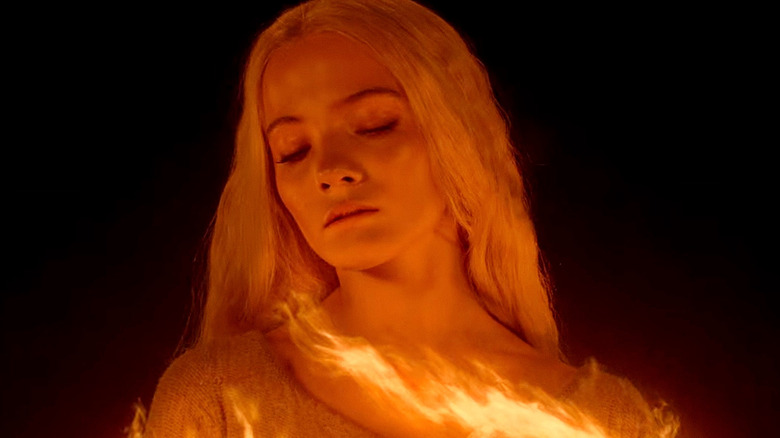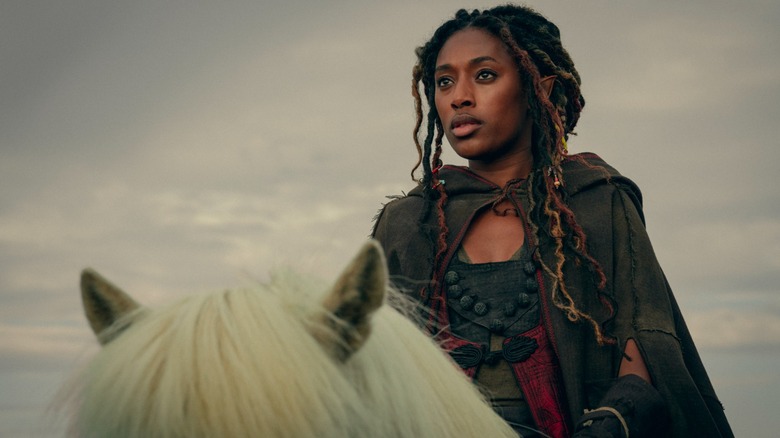The Witcher Showrunner Corrects A Common Misconception About The Ciri Prophecy
This post contains spoilers for "The Witcher" and "The Witcher: Blood Origin."
Now that the third season of Netflix's "The Witcher" has drawn to a close, it's safe to say that the prequel miniseries "The Witcher: Blood Origin" is more of a supplementary text than an essential spinoff. For the most part, the story of seven ancient warriors who brought about the Conjunction of the Spheres, leading to the collision of elven, monster, and human worlds, hasn't really come up in the flagship show's storyline. There are a few exceptions, though, including a moment in the penultimate episode of season 3 that sees a starving, hallucinating Ciri (Freya Allan) at the mercy of the spirit of the controversial rebel princess Falka.
When Falka (Hiftu Quasem) takes over Ciri's psyche, presenting her with visions of what her world would look like if she were to give in to her fire magic completely, she mentions a looming "time of contempt." Fans of Andrzej Sapkowski's "The Witcher" book series will recognize that phrase, and not just because it's the title of the second novel in the series. The "time of contempt" comes up in a prophecy shared by Ithlinne, who appears as a character played by Ella Schrey-Yeats in "The Witcher: Blood Origin." Though Ithlinne doesn't mention the line in the show, she does use it in Sapkowski's book "Blood of Elves," with a prophecy that references "The Time of the White Chill and the White Light" as well as "the Time of Madness and the Time of Contempt."
Watch out for the time of contempt
At the end of that prophecy in "Blood of Elves," Ithlinne references a future child, "a seed which will not sprout but burst into flame." In the Netflix miniseries, Ithlinne's prophecy is different, but has a similar message:
"The time of the spheres is upon us
Aen Seidhe lost across the skies
Cast adrift in time
Ever searching for love
Lost, and left behind
The Lark's seed shall carry forth
The first note of a song that ends all times
And one of her blood shall sing the last."
Given what we know about how special Princess Cirilla's Elder Blood is, how many people think she's fated to change the world, and even her recent run-in with Falka and fire magic, it's reasonable to assume that the prophesied child could be Ciri. But in an interview with Entertainment Weekly after "The Witcher: Blood Origin" aired, showrunner Lauren Schmidt Hissrich says that fans might want to slow down on the theorizing. "The prophecy I actually think is not as clear cut as many people think," Hissrich told the outlet. "It does seem to immediately say Ciri is related to Éile, and that is not the case. So we can dispel that rumor right now."
Ciri may not have a connection to The Witcher: Blood Origin after all
Éile (Sophia Brown) is the character from "The Witcher: Blood Origin" who ends up pregnant by the series' end, and Ithlinne shares her prophecy after touching her belly and, presumably, seeing her family's future. According to Hissrich, the prophecy "is a little hidden gem for us, and we have other things brewing with that." One of the things the team may have had brewing was the introduction of Falka, who tells Ciri, "There will be a time of contempt, and then finally, you can take back what's yours." It seems pretty significant that Ciri is engulfed in flames at the time, an image that calls to mind the line in the book's prophecy about "a seed which will not sprout but burst into flames." Of course, the show's prophecy isn't the book prophecy, and the writers of "The Witcher" could have any number of twists up their sleeves.
Hissrich doesn't seem to be dispelling the idea that Ciri could be the prophesied child, but is noting that she may not be related to Éile as many have assumed. In the same interview, she notes that the show purposely plants in some ideas for later payoff, including the prophecy at the end of the prequel series. "You have to trust that if we made a decision at a certain point that we did it for a reason, that you're gonna find out later," Hissrich says. It sounds like the prophecy isn't the only thing sprouting seeds that will grow in surprising ways later on.
"The Witcher" season 3 is now on Netflix.


